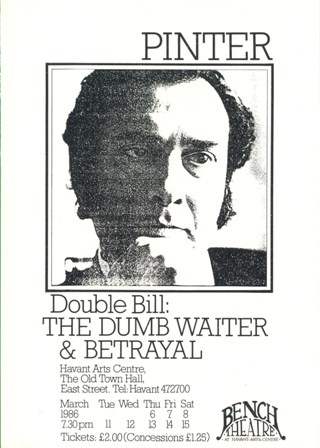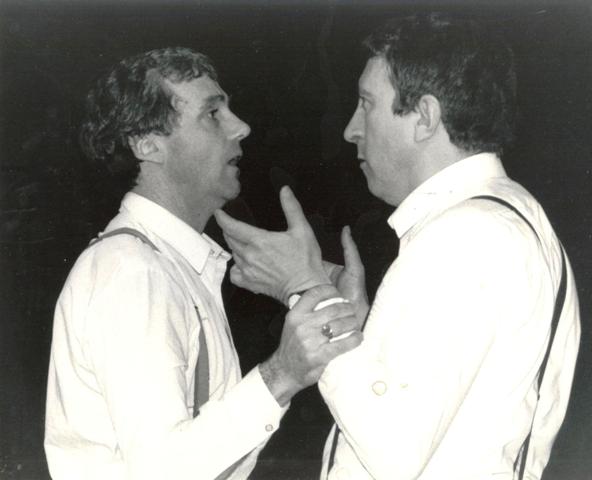The Dumb Waiter and Betrayal
Written by Harold Pinter
Thurs 6th March - Sat 8th March & Tues 11th March - Sat 15th March 1986
Directed by Jane Hart & David Brown
A Double Bill spanning the career (to-date) of one of our most original dramatists;
'The Dumb Waiter' (1957) humorously combines the reassurance of the familiar with the threat of the unknown.
'Betrayal' (1978) is a sharply realistic study of the development and breakdown of relationships.
previous
production
next
production
AuthorHarold Pinter
Harold Pinter CH. CBE (1930 - 2008)
Harold Pinter was perhaps the best known English playwright since the second world war; and was among the most influential British playwrights of modern time.
He was a child when war broke out and it made a strong and lasting impact on him; he found separation from his parents difficult when he was evacuated from London to Cornwall, and as a young man he was fined a substantial amount for refusing to do his national service.
At school he had read widely - both literature and poetry and particularly the works of Kafka and Hemingway - and acted in productions. He spent two years studying at the Royal Academy of Dramatic Arts in London, but he never settled there and did not complete his course. He earned his living as an actor for some years before starting to write plays himself. His first play to be commercially successful was 'The Caretaker' in 1960 which, although critical reaction was mixed; Pinter's style was already distinctive, and not always popular with the critics. After becoming established as a writer, he went on to direct widely, serving under Peter Hall as associate director of the National Theatre. As well as the stage, Pinter has written extensively for British television and radio, and as a screenwriter of feature-films, and he has also directed for all of these media.
His plays often feature a sense of impending danger with the characters frequently under threat from people or forces they (and the audience) cannot understand or control. This menace and implied violence is more palatable to audiences because it is interleaved with often-unexpected humour. Although many of his plays are set in a single room or space, they often contain strong visual imagery.
His 1965 play 'The Homecoming' won a Tony Award, the Whitbread Anglo-American Theatre Award, and the New York Drama Critics' Circle Award. These were followed by many others across all areas of his work, including the Berlin Film Festival Silver Bear, the Austrian State Prize for European Literature, BAFTA awards in 1965 and in 1971, the Hamburg Shakespeare Prize, the Cannes Film Festival Palme d'Or in 1971, and the Commonwealth Award in 1981. He was awarded a CBE in 1966, but later turned down a knighthood. In 1996 he was given the Laurence Olivier Award for a lifetime's achievement in the theatre. In 2002 he was made a Companion of Honour for services to literature and in 2005 won the Nobel Prize for Literature.
The Dumb Waiter was written in 1957 and was one of Pinter's first plays. It was first produced at the Hampstead Theatre Club in 1960 co-inciding with Pinter's success with 'The Caretaker'.
Gus and Ben are hired killers; from time to time they are sent on missions by a mysterious organisation. They are told barely more than the address at which they have to call; then they just have to stay there and await further instructions. We join them (the nervy Gus and aggressive Ben) as they sit in a dingy basement waiting for their next instructions. Inexplicably - and in traditional Pinter style - a disused dumb waiter in the wall starts sending increasingly odd requests for food from the restaurant above. Ben and Gus have worked together for some time but this particular day deviates progressively more from their usually efficient routine.
Marking a major stylistic change, 'Betrayal' is Harold Pinter's seventh full-length play and was written in 1978. Gone are the menace and obscurity of his earlier works, replaced by a stark realistic tale of life among London's Literary establishment. The complex web of friendship, love and betrayal woven by Jerry, Robert and Emma is revealed in Pinter's sparse, acutely observed dialogue. Betrayal was first produced by the National Theatre in 1978 and won the 1979 Laurence Olivier Award for Best New Play
Inspired by Pinter's clandestine, 7-year, extramarital affair with BBC Television presenter Joan Bakewell, the plot exposes different permutations of betrayal occurring over a period of nine years, relating to an affair involving a married couple, Emma and Robert, and Robert's 'close friend' Jerry.
top of page

These plays were staged at Havant Arts Centre, East Street Havant - Bench Theatre's home since 1977. The 50-minute 'Dumb Waiter' was staged at the start of each evening, followed by the full-length 'Betrayal' after the interval as a 'Pinter Double-Bill'.
| Gus | Pete Woodward |
| Ben | Peter Corrigan |
| Director | Jane Hart |
| Emma | Gina Cameron |
| Jerry | John Valentine |
| Robert | David Penrose |
| Waiter | Pete Codd |
| Director | David Brown |
Crew
| Stage Manager | Pete Codd |
| Lighting | Jacquie Penrose |
| Set Construction | Peter Holding |
| Publicity | Jo German |
| Publicity Display | Clawson Morris |
| Photographs | Chris Shaw |
| Sound | Sue Cooremans
Barbara Lynch |
| Props | Janice Bell
Bill Bickers |
| Front of House | Janice Bell |
top of page
The NewsAnon
Evening in Pinterland
Nervous laughter is the order of the evening when Havant's Bench Theatre stage their Pinter double bill. The first play, 'The Dumb Waiter' is an early work in Pinter's oft-parodied 'thriller' style of long pauses and sparse, banal dialogue hiding an invisible menace - with moments of high, almost slapstick comedy which allow a giggle or two to relieve dramatic tension. 'Betrayal' is his most recent full-length play, and in a completely different style. It reveals the build-up and breakdown of relationships within the eternal triangle. Here the laughter is the uncomfortable kind born of recognition.
In 'The Dumb Waiter', Peter Woodward and Peter Corrigan build up the tension nicely between themselves and the little black hatch, aided by the fact that they physically look like victim and predator. I know director Jane Hart wants them to play the characters with deliberate ambiguity, but at the moment the impression left is perilously close to muddle. 'Betrayal' has much pathos but is marbled with a richly ironic vein and Gina Cameron John Valentine and David Penrose are in there digging it out in nuggets.
Performances are at Havant Arts Centre, The Old Town Hall, East Street, tonight and Saturday from Tuesday to Saturday next week.
The News, 7th March 1986
top of page
Production Photographs

